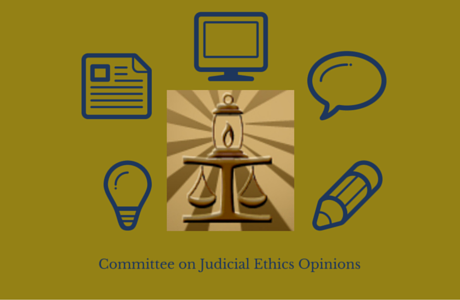Supreme Court Committee Issues Advice on Accepting Gifts and Honors for Inn of Court Service
A state Supreme Court committee today posted a summary of oral advice given to a judge who is retiring from decades of service on an Inn of Court executive committee, but who is not retiring from the bench. About 30,000 people belong to American Inns of Court chapters, which bring together judges, attorneys, and law students to improve the law and the administration of justice through education, mentoring, and socializing.
In a summary of the advice, the Supreme Court Committee on Judicial Ethics Opinions concludes that a private testimonial dinner hosted by the Inn of Court executive committee to honor the judge’s retirement is an acceptable gift. The committee also concludes establishing an annual law student award for achievement in the judge’s name is a permissible honor, and that the judge could also accept a framed commemoration of the award.
The committee examined the rules governing gifts, and authorities interpreting those rules, to conclude that the retirement dinner is a private testimonial because attendance will be limited to executive committee members. The judge may accept the dinner as a gift because of a preexisting relationship with the attorneys paying for the dinner. The judge’s close personal friendships with those attorneys, forged over years of service together on the Inn of Court executive committee, leads the judge to routinely disqualify from hearing those attorneys’ cases. This practice places the cost of the judge’s meal within an exception to the general rules against accepting gifts from attorneys.
While not a gift to the judge, the law student achievement award does not require fundraising or advance any monetary interests, so the committee determines that it is a permissible use of judicial title. The framed commemoration of the award presented to the judge is not a gift under the code or the statute because it is a personalized honor. Nonetheless, the committee concludes that the cost of framing the commemoration would also be acceptable as a gift incidental to the retirement dinner based on the judge’s preexisting relationships and disqualification practices.
"The Code of Judicial Ethics recognizes the importance of the educational services this judge is being honored for at the private retirement dinner, and the committee hopes its guidance will encourage such service and tributes,” said committee chair Justice Ronald B. Robie.
About the Committee on Judicial Ethics Opinions (CJEO)
The Committee on Judicial Ethics Opinions is a 12-member advisory committee that includes appellate justices, trial court judges and commissioners. The committee is appointed and authorized by the California Supreme Court, but its work is independent of the court, the Judicial Council, and all other entities. Its opinions are advisory and do not necessarily reflect the views of the California Supreme Court or any other entity.
The committee issues formal opinions, informal opinions, and oral advice on proper judicial conduct pursuant to the California Code of Judicial Ethics and other authorities.


